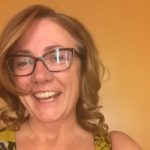Instead Of Looking For Your Purpose Or ‘One Thing’,…
Tweet This
[themecolor]
When talking about their careers, there are two stories I often hear women telling themselves:
- “Unless I figure out the one thing I’ve always wanted to do, I’m going to be miserable.”
- “I’ve invested so much time striving to be successful in this industry, if I transition to something else it’ll have all been for nothing.”
Women (and men) often feel an urgency to find their ‘one thing.’ Or, they stay in the same industry longer than they’d like because they feel obligated or stuck. To discuss finding purpose and getting unstuck I talked with Nicole Antoinette, the host of the Real Talk Radio podcast. Antoinette is a self-described “recovering self help addict” and a queen of reinvention.

Nicole Antoinette Photo Credit: Foxes + Wolves
With a resume that includes highlights such as camp director, owner of a web design firm, goal setting coach, and cookie shop owner, Antoinette says the theme of her career has been change.
This is a dramatic juxtaposition to her husband, an engineer at Twitter whose path has been pretty linear. She says, “He’s taken the more traditional or ‘recommended’ path that was put on a pedestal when I was younger: pick your thing and become really good at your thing.”
Around the time she turned 30, Antoinette struggled with shame and guilt that she hadn’t found her ‘one thing’ like her partner. Without her ‘one thing’ all the choices she had made in her 20s felt like a waste. She asked herself, “What’s wrong with me that I’ve had all of these seemingly unrelated careers?”
Paths Aren’t Always Linear, But Skills Are Transferable
Antoinette felt badly about this pattern of behavior until she had a realization. “The model of pick one thing, get better and better at that thing, and always be continually interested in that thing is actually pretty rare.” Stories of achieving greatness through perseverance in the same profession (picture Michael Phelps) are the ones celebrated in the media, she argues, which causes us to falsely believe that kind of career consistency is the norm.
In addition to craving an idealized ’one thing’, people are reluctant to lose all the opportunities they’ve created for themselves in their industry. Antoinette, who’s had at least 4 careers already, says if you go to do something else, all the experience, skills, and relationships you’ve developed come with you. “ It’s not like you leave a job or an industry and someone comes and ‘Men in Blacks’ your brain ,” she explains referencing the memory erasing technology from the popular film series.
For example, the same organization and communication skills that made her a good camp director were a tremendous asset when she ran her own business. As I started my consulting practice, a woman I’d met in my last role, managing a political campaign, became my first client.
Ask Yourself Good Questions
When it comes to her own transitions, Antoinette says the best advice she’s ever gotten is to ask yourself good questions, such as:
- What’s something you’ve been told is really important that actually isn’t important to you?
- What are you willing to give up?
- What’s true for you that you’ve been denying?
Referencing her own experience, Antoinette says, “If you’re actually willing to go back and ask yourself again and again, eventually you just get sick of yourself,” and get to the answer.
Asking herself those questions relentlessly, she realized she didn’t care about having a big flashy career. She says it took all of her 20s to accept that a “capital C Career” wasn’t important to her. She challenged the idea that there was a finite destination to reach, and she’s not looking back. Or as she says,“F*ck, I’m so much happier now.”
Whether you’re just starting out in your career or decades in, consider giving yourself permission to explore what kind of work is fulfilling rather than searching frantically for your ‘one thing’. Who knows, maybe cookie shop owner is in your future.
Lelia Gowland helps women negotiate and navigate their careers. Learn more about her e-courses on negotiating a raise, a promotion, and a new position at gowlandllc.com.
Through The Grapevine

- Dawn Bardessono, co-founded Benchmark Consulting in 1995, aspiring to combine her passion for the wine business with her expertise in attracting high-quality talent. Dawn oversees and takes the lead on all senior-level searches at Benchmark Consulting, utilizing her prior wine experience in the business and keen understanding of clients' needs to create lasting relationships
Latest Posts
 Careers in WineMarch 10, 2021The Hundred Year Company
Careers in WineMarch 10, 2021The Hundred Year Company Career InsightsAugust 26, 2020Our Focus: Peace of Mind
Career InsightsAugust 26, 2020Our Focus: Peace of Mind HiringMay 6, 2020Now Is an Unprecedented Opportunity to Hire Great Talent…
HiringMay 6, 2020Now Is an Unprecedented Opportunity to Hire Great Talent… Careers in WineApril 8, 2020Ladies and Gentlemen Taking Care of Ladies and Gentlemen
Careers in WineApril 8, 2020Ladies and Gentlemen Taking Care of Ladies and Gentlemen